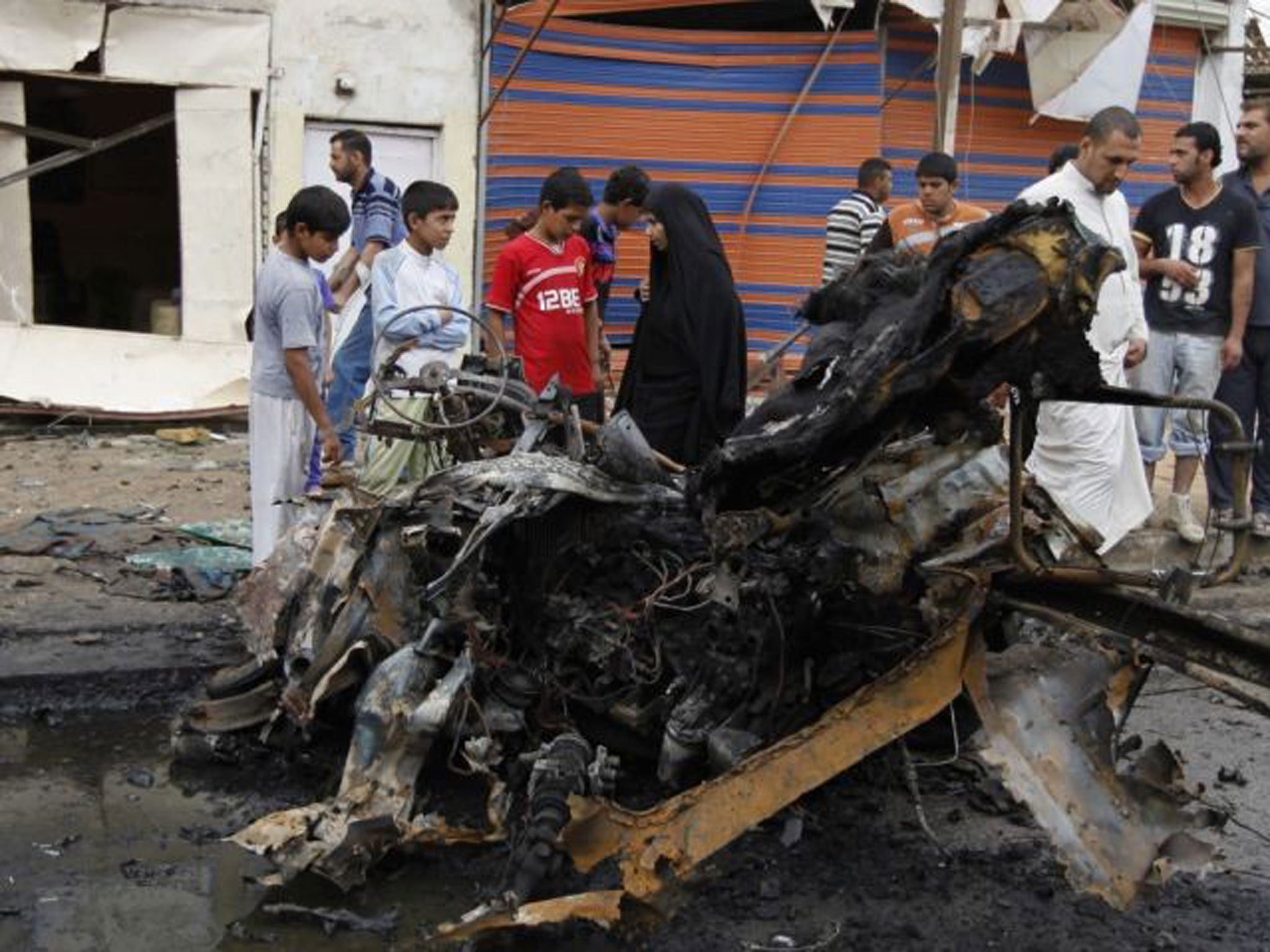Blasts and shootings claim 90 lives in Iraq as sectarian violence rises
Tensions have been worsening since Iraq's minority Sunnis began protesting what they say is mistreatment

Your support helps us to tell the story
From reproductive rights to climate change to Big Tech, The Independent is on the ground when the story is developing. Whether it's investigating the financials of Elon Musk's pro-Trump PAC or producing our latest documentary, 'The A Word', which shines a light on the American women fighting for reproductive rights, we know how important it is to parse out the facts from the messaging.
At such a critical moment in US history, we need reporters on the ground. Your donation allows us to keep sending journalists to speak to both sides of the story.
The Independent is trusted by Americans across the entire political spectrum. And unlike many other quality news outlets, we choose not to lock Americans out of our reporting and analysis with paywalls. We believe quality journalism should be available to everyone, paid for by those who can afford it.
Your support makes all the difference.Iraq is edging closer to all-out sectarian war between Sunni and Shia Muslims as a series of car bombings and shootings killed at least 90 people and left many others injured.
Casualty figures are returning to a level not seen since the civil war of 2006-7. Most of the car bombings targeted markets, bus stops and other places crowded with civilians. A total of 10 car bombs killed 46 people and injured 150 in Baghdad, and another two bombs in the Shia port city of Basra in the south killed a further 13 and injured 40. In the town of Balad, north of Baghdad, a car bomb exploded next to a bus carrying Iranian pilgrims, killing six Iranians and one Iraqi, a police officer said.
In the overwhelmingly Sunni province of Anbar in west Iraq, 12 policemen, kidnapped from a bus travelling on the main road between Baghdad and Jordan on Saturday, died during a botched rescue mission. The policemen were reportedly all shot in the head, suggesting that they had been executed by their captors during an attempt to free them.
The Sunni Arabs in Anbar, which sprawls across the west of the country, are increasingly in a state of armed rebellion. The security situation has deteriorated sharply since an attack by government forces on a peaceful protest by Sunni at Hawaijah in Kirkuk province on 23 April in which at least 44 people were killed. Eight policemen, including two officers, were killed in an attack on a police station in Haditha yesterday and a further four police were killed and three wounded in an attack by tribesmen in Rawa. Both places are in Anbar.
On Saturday, in the provincial capital of Ramadi, security forces tried and failed to arrest Mohammed Khamis Abu Risha, nephew of a powerful tribal leader, alleging that he is connected with the killing of five soldiers. Armed tribesmen fought back to prevent the arrest during which two people were killed.
The overall level of violence in Iraq has increased markedly in recent weeks as al-Qa’ida in Iraq gains in strength. The Sunni, one fifth of Iraq’s 33 million population, are emboldened by the Sunni uprising in Syria. Their protests against discrimination and persecution were largely peaceful for the five months up the Hawaijah massacre, but they are turning to armed resistance against government security forces.
“The moderate Sunni are losing ground,” says Iraqi political scientist Ghassan al-Atiyyah. Iraqi Prime Minister, Nouri al-Maliki, has been criticised for failing to conciliate the Sunni protesters before the current wave of violence. The dominant Shia majority in Iraq are frightened that they will be the victims of a Sunni counter-revolution. The Shia-run security forces are likely to retaliate in kind over the killing of so many policemen in Anbar.
The bombing and shootings have killed over 200 people since last Wednesday, with Sunni and Shia bombers alternating in attacking each other’s neighbourhoods. These tit-for-tat bombings are different from those over the last five years when bombings were almost all carried out by al-Qa’ida against Shia and government targets.
Bomb attacks on Sunni in the last few weeks suggest that Shia militias, responsible for mass slaughter of Sunni civilians in the past, are again active. During the civil war Sunni were driven from many mixed areas in Baghdad into a few enclaves.
Join our commenting forum
Join thought-provoking conversations, follow other Independent readers and see their replies
Comments